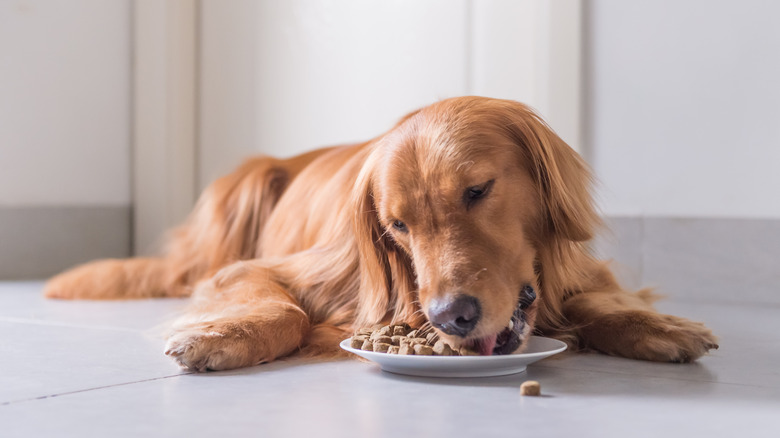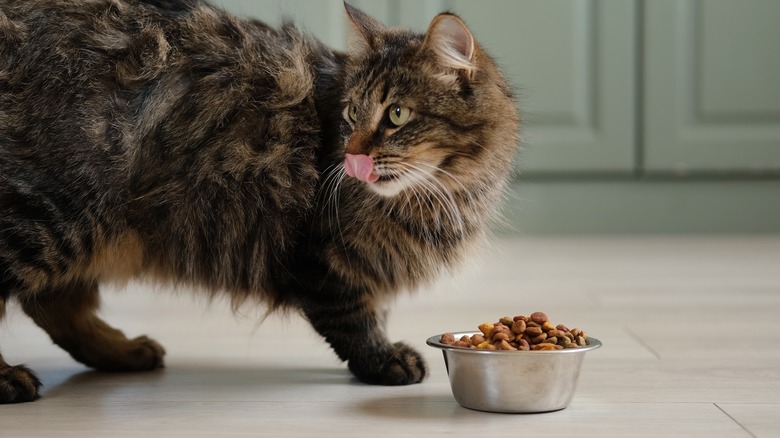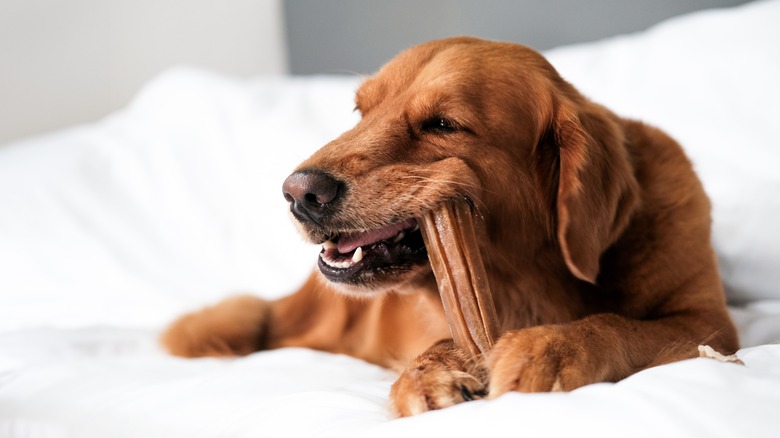Busting The Myth Dry Food Can Clean Your Pet's Teeth
Both cats and dogs are highly susceptible to dental disease caused by poor oral hygiene, making the idea that dry food can clean your pet's teeth highly attractive. According to the Cornell Feline Health Center, studies have shown that between 50 and 90% of cats over the age of four live with dental disease. Meanwhile, more than 80% of dogs age three and up have dental disease, per VCA Animal Hospitals. Unfortunately, dry food has not been proven as a method for improving your pet's oral hygiene, and may actually put them more at risk for teeth and gum-related problems. "It's folklore," Jonathan Block, DVM, told The Farmer's Dog. "There is no evidence-based research that supports the claim that eating typical kibble helps prevent dental disease."
Dry food has no positive impact on your cat's pearly whites for multiple reasons. Mainly, this is because they tend to swallow their food whole. Even if your feline friend chews their meals, dry cat food pieces are often delicate and break apart before their teeth have a chance to fully pass through them. Similarly, while it may seem like crunching on some kibble might help to remove plaque from your dog's teeth, it actually has the opposite effect. Dry food often sticks to your canine's teeth, and if not taken care of immediately can lead to bacterial growth and tartar buildup, which can cause other dental issues.
The origin of this myth and why dental diets might be a better choice
Many people assume that, due its consistency, dry dog and cat food will scrape over their pets' teeth and help remove plaque when they chew it. Yet, this actually isn't the case at all, as the hardness of the kibble causes it to break apart as soon as it comes into contact with their teeth. Some special dental diets for both cats and dogs might do a better job of keeping your pet's teeth clean.
Dental formulations typically consist of softer and bigger pieces than the kibble you'd find in regular dry food. Due to this, your pet can bite completely through the kibble, allowing for plaque removal. Often, these foods also have a rough texture that assists with scraping off plaque.
While experts tend to agree that dry food isn't the greatest option when it comes to keeping your cat and dogs' teeth clean, some say that it's a better choice than wet food for oral health. Due to the consistency of wet food, it can stick to teeth and gums, potentially leading to dental issues (of course, some experts have expressed the same concern about dry food). Overall, no matter the type of food you feed your cat or dog, the best way to remove plaque after they eat is by brushing their teeth.
What about dental treats and chews?
While standard dry food likely doesn't provide oral health benefits for your pet, there are other steps you can take at home to help protect their chompers. Aside from brushing, dental treats have their perks. Often, dental treats contain ingredients such as anti-calculus agents that help prevent plaque from forming, as well as antimicrobial properties to prevent bacteria. Similar to dental diets, dental treats are more effective than regular dry food due to their size, allowing them to cover more of the tooth's surface when your cat chews them. Providing some cat chew toys is another great approach for bolstering their dental health.
Dogs also love to chew, and dental bones are one way to supplement their oral hygiene. Unlike kibble that sticks to your pup's teeth and breaks before they can properly benefit from it, dental bones and chews typically have an abrasive texture that helps scrape off plaque and tartar. Beyond dental bones, simply chomping on chew toys can help keep a canine's teeth clean, especially durable dog toys that are good for heavy chewers.


